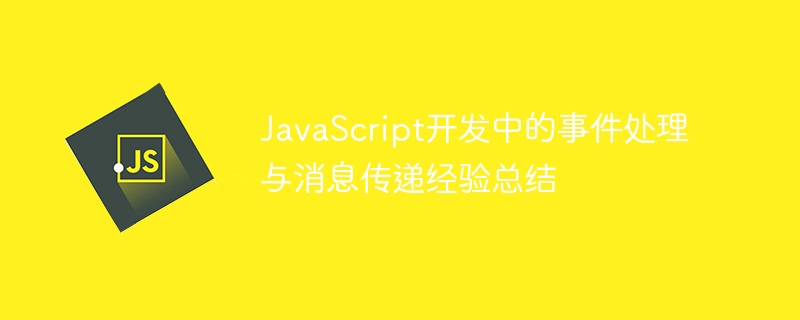

In JavaScript development, event handling and message passing are very important concepts. They are widely used in front-end development and provide powerful support for user interaction and component communication. In this article, I'll summarize some of my experiences with event handling and messaging, and share some practical tips and considerations.
1. Event processing
Event processing refers to performing specific operations under specific trigger conditions. The following are some common event handling scenarios and techniques in JavaScript development:
1. Event binding: Use the addEventListener() function to bind events to elements. In addition, you can also bind events by using attributes such as onclick directly on the HTML tag. It should be noted that addEventListener() can bind multiple handlers to the same event of an element at the same time.
2. Event bubbling and event capturing: Event bubbling means that when an event on an element is triggered, the event of its parent element will also be triggered; event capturing is the opposite. By default, event processing occurs during the event bubbling phase. You can specify that event processing is performed in the capture phase through the third parameter of addEventListener().
3. Event delegation: Event delegation refers to delegating event processing to its parent element or ancestor element. This can reduce the number of event handling functions and improve performance. For example, you can delegate a click event to the parent element, and use the target attribute of the event to determine the specific child element that was clicked.
4. Prevent event bubbling and default behavior: You can use the stopPropagation() method of the event object to prevent event bubbling, and use the preventDefault() method of the event object to prevent the default behavior of the event.
5. Avoid excessive event processing: Excessive event processing may cause performance problems. Try to reduce the number of event processing functions as much as possible, and you can also use techniques such as throttling and anti-shake to reduce the number of event processing.
2. Message passing
Message passing refers to the transmission and sharing of data between different components. Here are some common messaging scenarios and techniques in JavaScript development:
1. Global variables and global objects: You can use global variables or global objects to store and share data. However, it is important to note that global variables may cause naming conflicts and data security issues.
2. Publish-subscribe model: The publish-subscribe model is a common messaging model. By defining events and event listeners, different components can communicate with each other by publishing and subscribing to events.
3. Observer pattern: The observer pattern is also a common messaging pattern. Components can pass messages by adding observers, notifying observers, etc.
4. Message queue: Message queue can be used to store and process messages. Message queues can be implemented using data structures such as arrays or linked lists.
5. Callback function: The callback function is a classic message passing method. You can pass a function as a parameter to another function and call the callback function at the appropriate time to deliver the message.
3. Notes
In event processing and message delivery, you also need to pay attention to the following points:
1. Naming convention: for events, observers, and event listeners When naming devices, etc., you need to follow certain naming conventions to ensure the readability and maintainability of the code.
2. Error handling: During event processing and message delivery, abnormal situations may occur. Errors need to be handled appropriately to avoid problems such as program crashes or data loss.
3. Component decoupling: In messaging, it is necessary to decouple different components as much as possible to avoid too many dependencies. This improves code reusability and testability.
4. Performance optimization: In event processing and message delivery, you need to pay attention to performance issues. You can use asynchronous processing, lazy loading and other technologies to improve performance.
To sum up, event handling and message passing play an important role in JavaScript development. Mastering relevant skills and precautions can improve the quality and efficiency of your code. I hope this article can be helpful to readers in event handling and message passing in JavaScript development.
The above is the detailed content of Summary of experience in event processing and message passing in JavaScript development. For more information, please follow other related articles on the PHP Chinese website!
 Why is my phone not turned off but when someone calls me it prompts me to turn it off?
Why is my phone not turned off but when someone calls me it prompts me to turn it off?
 How to set up hibernation in Win7 system
How to set up hibernation in Win7 system
 What does Jingdong plus mean?
What does Jingdong plus mean?
 The difference between cellpadding and cellspacing
The difference between cellpadding and cellspacing
 Sublime input Chinese method
Sublime input Chinese method
 How to solve garbled characters in PHP
How to solve garbled characters in PHP
 What currency is USDT?
What currency is USDT?
 rtmp server
rtmp server
 What is digital currency
What is digital currency




